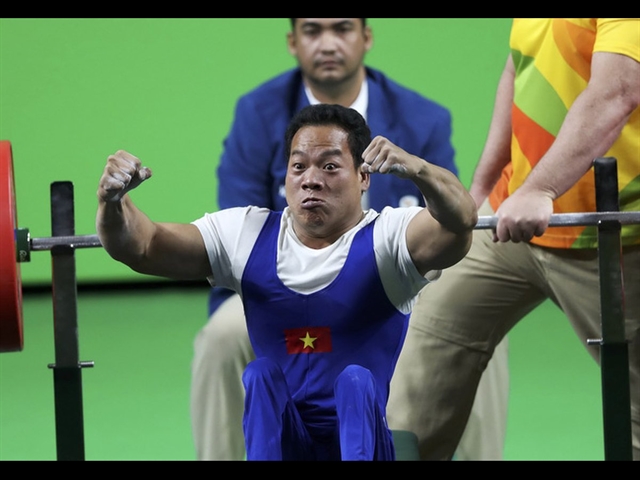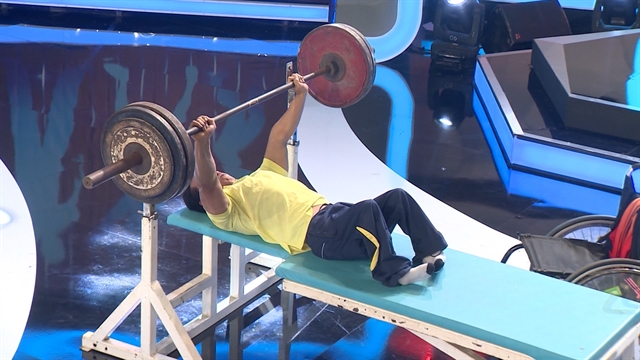Weather:
- Ha Noi 33oC
- Da Nang 28oC
- Ho Chi Minh 33oC

Lê Văn Công, 37, is the most successful Paralympic athlete in Vietnamese history. Công, who has two deformed legs, is defending powerlifting champion in the SEA Games, Asian championship, world championship and Paralympics. Before heading to Tokyo later this month to retain his title, he spoke to Thanh Hà about his preparation.
Inner Sanctum: It has been five years since the 2016 Paralympics gold and record. What does this mean to you and how did it change your life?
The gold medal and the record at the Rio de Janeiro Paralympics were an important milestone in my career. It has been and will be the most memorable mark in my life.
Over the past five years, many things have changed but one thing that has remained is that I am trying my best to repeat the success I had in Brazil.
After the Paralympic victory, my teammates and I received more care and support from leaders of different levels as well as managers of the HCM City SportsTraining Centre. They gave us better facilities and training equipment. Many old and out-of-date things have been replaced with new stuff, which had never been done before. It makes us more comfortable to practise and get better results.
Meanwhile, I received a small bonus which played a key role helping me buy a house in Củ Chi District, which is not far from the city centre.
Inner Sanctum: You are one of two powerlifters representing Việt Nam in Tokyo. How did you qualify for the event?
Actually there were four in my team. But in the final list, only Châu Hoàng Tuyết Loan and I were named. We were invited by the organisers.
We lost our official slots because of the COVID-19 pandemic.
In my case, I qualified for Tokyo after taking part in qualification tournaments in 2019. But according to International Paralympic Committee regulations, despite earning a berth, athletes must keep taking part and being in the top 10 of all test tournaments every year until the next event. I could not compete in 2020 and 2021, and then I was kicked out.
I will have to defend my title through the universality slot.
Inner Sanctum: How many times have you competed in the Paralympics? How do you train for the coming Games?
It is my third Games after the first two in 2008 and 2016.
Currently, I am focusing on improving my body strength while undergoing physiotherapy for my shoulder injuries.
I have a torn ligament and cartilage, which according to doctors needs up to six months to totally recover.
I suffered these injuries in late March and rested for three months. I have only returned to practise for several weeks.
I am training and listening to my body to avoid more serious pain. I hope that I will compete well in time for the Paralympics.
Here in HCM City, the pandemic is serious. Many community positive cases are found every day. I feel I could become an F1 any time. I am really afraid of being affected. Luckily, my teammates and I are practising within the National Sports Training Centre which has applied the rule of 'nobody in, nobody out'. This will make things a little safer for us.
Inner Sanctum: Have you researched your rivals in Tokyo? Do you know them and their results? What is your best currently?
Most of them are my long-time rivals and we have vied for medals for many years. We all know each other.
Up until 2019, I could see they were making progress with better results. But in the last two years I did not take part in international tournaments, so did not keep so up-to-date on everything.
I searched online and saw their scores in qualification tournaments. They were all worse than what I have done before. However, I think that the athletes will have their own plan which they will adjust to make their best performances fall on the key tournament. So the results of qualification do not reflect their real abilities.
As for me, my results have not been so good. Because of the injuries, I could not risk lifting anything too heavy; otherwise I would lose my Paralympic chance. I have maintained a lifting suitable weight up to 158kg and will increase it gradually. But it seems difficult to match the record weight.
Inner Sanctum: Heading to Tokyo as defending champion, do you receive a 'command' to bring home a gold, or do you set a target for yourself?
No, I am not given any orders. I am going to defend my top position with a free mind and no pressure. But I am confident about my iron mentality. I have never been affected by pressure. The more difficult and heavy the pressure the better result I will get.
I hope that I can overcome my limitations in Tokyo. At present, I am not sure of the maximum weight I can lift but I want my score better than in training. And I want to bring home a medal.

Inner Sanctum: After the Paralympics, which competitions will you take part in?
It is the World Open Powerlifting Championships in November, the Asian Games next October and the most important one is the SEA Games in Hà Nội, which could be delayed until next April.
I have been reigning champion of the world event since 2014 and hold the record of 183.5kg. I also topped the Asian championship in 2015 and 2017. Meanwhile I have dominated the SEA Games for a long time.
The regional and continental tournaments are not as tough as the world event and the Paralympics.
Inner Sanctum: Two years ago you held an auction of your 2016 world championship gold medal. The money was given to your sick neighbour. How is she now? What about your charity work?
Yes. It was when I came back home after practice at the centre. My neighbour told me that her 17-year-old daughter had cancer but had run out of cash. I thought a lot before making my decision.
I chose that gold because there was a link between me, the medal and the girl. I was really sick until two days prior to the event. I was not even sure if I could lift anything. Surprisingly, I got better, competed well and won title. I hoped this could be a strong push for her.
I wanted to sell it for around VNĐ25-30 million (US$1,100-1,300) but in the end I got VNĐ125 million, five times higher than my expectation.
Unfortunately, she could not make it and died about one year ago.
I have not thought of selling my medals for charity again. It is possible in the future, who knows, it depends on the case. I still donate to people with what I can produce from my farm.
Inner Sanctum: In Việt Nam, athletes in general have always earned enough from sports. What are you doing to feed your family?
I have a workshop producing and fixing electronic home appliances. And I work with my friends to run a clean and green farm. And I am also an occasional real estate broker. I get a pretty good income from these jobs but again the pandemic stopped me from working. I have temporally paused my business and focused on powerlifting only.
Income from sport could be enough for just me but it is difficult to feed my family well.
I have been stuck with this sport for 17 years but have never had monthly salary (as people who do sports with a disability are considered amateur). There are no financial regulations for us yet. We only get an allowance whenever we are going to compete in tournaments and have bonuses when we win medals.
We sometimes joke that we do the sport because it is our passion. We love it too much and could never give it up.
Even when I won at the Paralympics, some people promised me many things (including two apartments) but in fact I got nothing. Promises are promises.
But I am not sad about it. I considered these words for fun. It is better to just do a good job by myself no matter what people say.
Inner Sanctum: What are main disadvantages when a disabled person does sport?
We meet many obstacles, the most obvious one is moving around when practising. To us, these are the pressures and challenges but when we overcome them, we fall in love with sport which brings us many benefits.
Good health is the top one. Through sport we are confident to: integrate with the community; meet people in the same situation; make friends with and learn from international people; access different cultures; and introduce our country to the world.
Inner Sanctum: How can we get more attention on sport for people with disabilities and make it develop?
First, we need more care from sport officials to create suitable sport environment for people with disabilities. More competitions should be organised so that we can sharpen our skills, and these events should be spread widely among the community to let more people know and love it.
Second, regulations about salaries and allowances for athletes with disabilities should be built up. It would help us have a stable life and focus 100 per cent on sport.
I myself think that if I had more time to treat my injuries I could quickly train to gain my best form back. With my physique and ability, I could definitely be strong enough to participate in several Paralympics in the future and vie for medals with rivals all over the world. VNS


